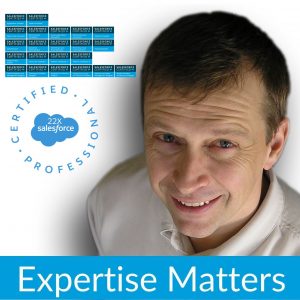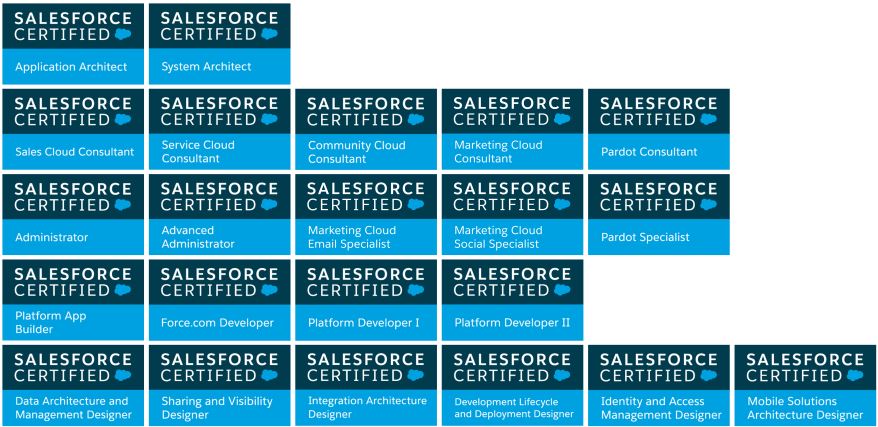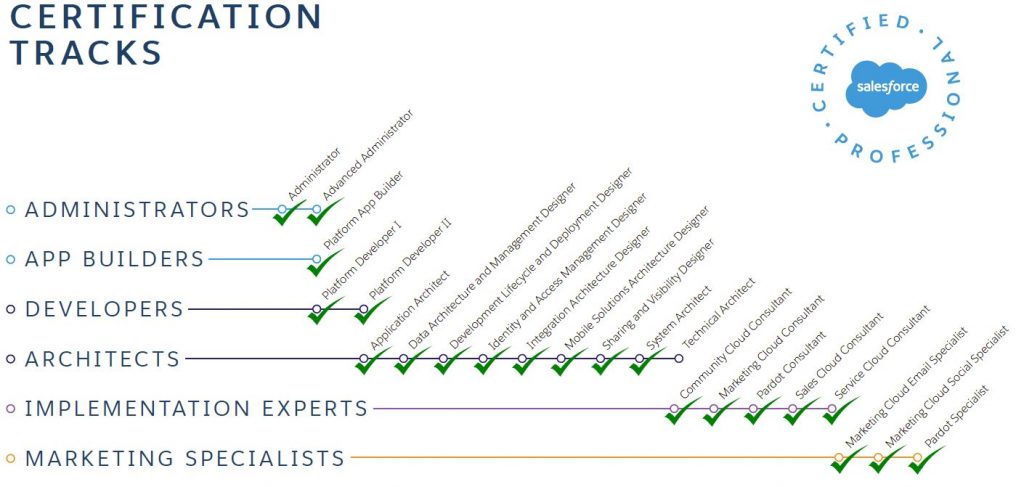 Richard Clarke is a Salesforce Consultant and runs his own Salesforce Consulting company called Artisan Consulting. He currently lives in Australia, and has 22 Salesforce certifications. Find out more about his extensive experience and journey below.
Richard Clarke is a Salesforce Consultant and runs his own Salesforce Consulting company called Artisan Consulting. He currently lives in Australia, and has 22 Salesforce certifications. Find out more about his extensive experience and journey below.
How and why did you get started with Salesforce?
My journey with Salesforce started in 2007. I was running my own business as a Microsoft Gold partner based out in New Zealand, and we had a U.S. client who engaged us to build a web application with Microsoft technologies, but he wanted it joined at the hip to Salesforce. He was creating personalized digital print marketing and had a vision of his customers starting in Salesforce, selecting an audience to receive some paper communications, selecting a print template and having the output personalized from CRM data. He ended up creating a closed loop – marketing business off the back of that, using CRM data so each piece coming off the printer varied depending on customer data.
The call-to-action usually sent the recipient back to the personalized landing page, and when they completed the form, the data went back into Salesforce. That was my first introduction with Salesforce and I had to work through questions like how do you integrate with it, what sort of data does it contain, what data might you use to personalize marketing. This was all back in 2007 in a digital print context. I personally helped him for a couple of years to architect that solution which ended up in the AppExchange. It’s called PrintSF.com. The business is still going successfully. The company that I was running in New Zealand at the time still does their ongoing development work now, 10 years later.
Initially, I was approaching Salesforce from an integration point of view; how do you integrate with it to get data out of it and back into it. I became excited about it being a far faster way to deliver business applications to people. I decided in 2008 to personally make it my focus to develop expertise on the platform.
It started in 2007 on the back of an integration project, because it was so fast to build business applications and deliver value to clients. I’ve been exclusively Salesforce since around 2008.
The consulting business in New Zealand is called FuseIT.com – it still continues. I am not involved with it directly now that I’m living in Australia. That business has been around since 1993, and still is a hybrid Microsoft partner + Salesforce partner business.
What is your role now and what does your day to day look like?
I’ve been running my own Australian business since I’ve moved here in 2010 purely as a Salesforce consulting practice. 18 months ago, I started a new business here in Melbourne called Artisan Consulting.
The reason for that is that the nature of the requests I was getting from clients changed. Originally, people came to me for Salesforce integration projects on the back of FuseIT being focused on “fusing” on-premise to cloud technology. I started this new company called Artisan Consulting that really reflected the different requests I was getting.
I’ve been doing Salesforce consulting for a long time, and I think the nature of the phone calls asking for help as a consultant changed throughout the 10 years. Originally, when I started, Salesforce was a relatively simple CRM. You could easily learn how to use and how to configure it – the whole point of Salesforce is using just point and click it easy to learn and easy to change. The technical complexities came primarily around integration.
Back when I started, you gave Salesforce to the sales team to manage their relationships, and a small percentage of the time; you might give it to the call centre. They weren’t really a mainstream call centre technology at the beginning, it was fairly basic.
Whereas now, we mostly work with medium to large size businesses who have got big customer success dreams around Salesforce, for sales, for marketing, for service, connected to mobile apps, websites, to back office IT systems. The complexity, every time you double the amount of systems you connect together results in four times the failure points. I was getting called more about how to do this well when it’s big and complicated and with multiple work streams and many interconnected systems. That’s where the Artisan brand came from – there seemed to be a market need for a boutique Artisan-grade service, where you could come in as the master crafts-person to augment an internal team to provide a level of expertise that they were maybe lacking. We continue to deliver that consulting service today. It’s just slightly different nature of service delivery to what it was back in 2008.
What would you suggest for someone that wants to start a Salesforce career?
It’s more important now to think a little more about where you want to focus. When I started, you could learn Salesforce wall to wall. I think there were three certificates available. It wasn’t impossible to learn it all.
It’s increasing difficult to do that now. Even with 23 certificates, there are still significant chunks of Salesforce that I haven’t gotten to yet. New acquisitions like SteelBrick for CPQ or DemandWare for the Commerce Cloud are both big chunks of technology I haven’t touched yet. I advise someone to think about their career path and where they want to end up. Are they wanting to be an operational administrator working at a client company? Do they want to write code and focus on the development stream? There’s obviously a clear architecture pathway now – a lot more architecture jobs being advertised whereas you didn’t used to hear about that at all.
What is your advice regarding certification and how to study for the exams?
Right from the beginning, I was architecting solutions and leading teams who are delivering project outcomes for customers. Salesforce didn’t talk about architects back in that era – my first certification was a consulting certificate back in the days when there was only one.
It was one of the rare courses that I’ve gone through with no computers in the room. I actually found that quite refreshing. It assumed that you knew how to use the product. It was all about how to ask clients the right questions so that you actually deliver the right outcome for them. It was very much about the consulting process, which I really enjoyed.
I knew enough about the architecture and the development, but it was good to have input on what it means to be a good consultant.
The first thought regarding certifications themselves is that they don’t prove a lot on their own. You can pass an exam and most exams allow for 9 attempts. If you can’t pass it in 9 attempts, you’re probably in the wrong career anyway. Certificates – I do treat them very seriously. I have obviously invested a lot of my own time to get certified.


In Artisan Consulting, all the staff have their remuneration stepped quarterly based on their progress through certificates and Trailhead. We have a formula that calculates these salary increments. Whilst certificates are definitely important when it comes to hiring someone, being certified doesn’t really prove competence. I like to look at a blend of Salesforce Trailhead and industry experience, which can give me a bit more confidence around someone’s capability.
The certifications prove that you had knowledge at one point. We’ll often get someone to do something practical as part of an interview – if you’re hiring a developer, I’d give them something to go and do. You’d be surprised at how often the work you get back is not what you’re expecting. I interviewed someone who had an Advanced Developer certificate, and they were off-shore, wanting to move to Australia – and this is not a certificate that is easy to get as you have to do a programming assignment, and you’ve got to be pretty good to pass. I gave this person an assignment to do and it was terrible. He wouldn’t have passed with it – so how does that work?
You just don’t know so take certifications as a good signpost that someone takes knowledge seriously and they’ve put effort in. They’re clearly capable to learn. I would definitely encourage people, but you have to keep it in balance.
What Certification are you studying for now?
Focus on Force currently provides practice exams and study guides for sixteen certifications


